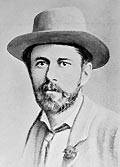Edward Carpenter (Edward Carpenter)

Author, Poet. Born in Brighton on the South coast of England at 45 Brunswick Square to a comfortable, middle-class family. Son of Lieutenant Charles Carpenter, he was from a long line of naval officers. Both grandfathers and his brother was Commander Alfred Carpenter, father of Vice-Admiral Alfred Francis Blakeney Carpenter. One of ten children in his teenage years he was the only son with six sisters his brothers being the last three children to be born to his parents. He entered Cambridge in 1864, was ordained to holy orders in the Anglican Church in 1870 to become a fellow of Trinity Hall, Cambridge, as was required at that time, and was appointed, curate of the Church of Saint Edward. He joined the Republican Club, led by Henry Fawcett and his wife Millicent Garrett, daughter of suffragette Louisa (Dunnell) Garrett and cousin of Amy (Garrett) Badley who’s husband was a good friend. This led to his leaving the church in 1874 when he became a lecturer on astronomy, science and music. His views on politics and social reform were evolving and leading to the idea of a utopian future. His ideas were appreciated by his contemporaries including E M Forster, William Morris and Walt Whitman, Ralph Waldo Emerson in America. He wrote of Whitman saying “No one could be more considerate, I may almost say courteous; no one could have more simplicity of manner and freedom from egotistic wrigglings; and I never met any one who gave me more the impression of knowing what he was doing than he did. Yet away and beyond all this I was aware of a certain radiant power in him, a large benign effluence and inclusiveness, as of the sun, which filled out the place where he was – yet with something of reserve and sadness in it too, and a sense of remoteness and inaccessibility.” He would also serve as a great inspiration to his friend D H Lawrence. By 1880 he had acknowledged his homosexuality and was enjoying improved health from the country air where he boarded with Albert Fearnhough, a scythe riveter from Sheffield his wife and children. When his father died in 1882 he gained a considerable independent income enabling him to purchase “Millthorpe Cottage” a farm and orchard on the Derbyshire Moors, where Fearnhough and his family moved in with him. He was now able to concentrate on his writings. In 1889 he was a strong supporter of “the New School Abbotsholme” being started by Cecil Reddie and where he had gotten John Haden Badley to come on board another building block toward Bedales. This was also a time where there was much discussion of Eastern mysticism with the growing Theosophical movement. By 1890 he as able to travel to Ceylon and India. Millthorpe became home to a spirit of ‘mystic socialism’ which were the vehicle for many idealistic campaigns from vegetarianism, air pollution, ‘rational dress,’ the ‘simplification of life,’ to sandal-making and wearing. He met George Merrill on a train shortly after his return from India in 1891 and would move in with him permanently in 1898. They were constant companions for the better part of forty years. Merrill died suddenly in 1928 and following that “there was only the end to be desired.” In May of that same year he suffered a paralytic stroke which rendered him almost helpless but he would live almost another 13 months. On December 30, 1910 he had written: “I should like these few words to be read over the grave when my body is placed in the earth; for though it is possible I may be present and conscious of what is going on, I shall not be able to communicate…” Unfortunately the existence of his request was not discovered until several days after his burial. The closing words form the epitaph engraved on his tombstone: “Do not think too much of the dead husk of your friend, or mourn too much over it, but send your thoughts out towards the real soul or self which has escaped-to reach it. For so, surely you will cast a light of gladness upon his onward journey, and contribute your part towards the building of that kingdom of love which links our earth to heaven.” (bio by: D C McJonathan-Swarm) Family links: Spouse: George Merrill (1866 – 1928)* *Calculated relationship
Born
- August, 29, 1844
- England
Died
- June, 06, 1929
- England
Cemetery
- Guildford Cemetery
- Surrey
- England

